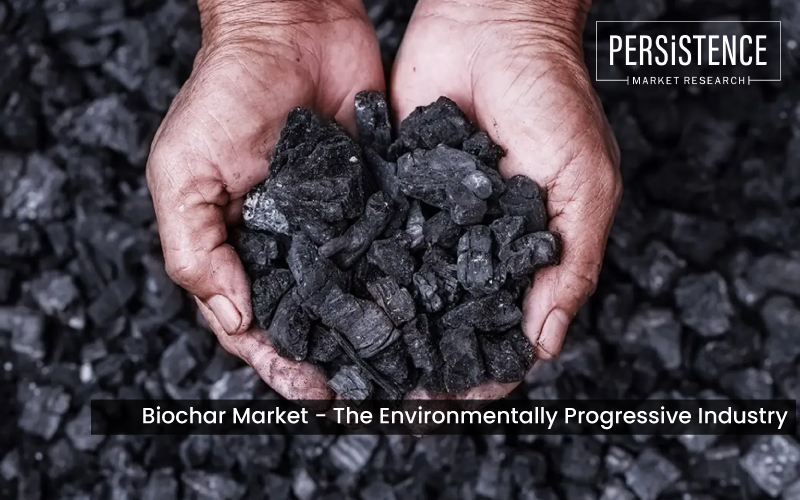- Blog
- Biochar Market The Environmentally Progressive Industry
Biochar Market - The Environmentally Progressive Industry
Published On : 16 Jul 2024
The global biochar market reached a value milestone of $600 million, showing an impressive 91% growth rate in production from 2021, according to a recent report by the International Biochar Initiative (IBI) and the US Biochar Initiative (USBI). This expansion demonstrates the industry's promising future and its vital part in the fight against climate change.
Among the CDR technologies endorsed by the Intergovernmental Panel on Climate Change (IPCC) is biochar. The IPCC also adds that, as of yet, no emissions budget scenario provides for the prospect of remaining on a 1.5-2C route without reducing greenhouse gas emissions in conjunction with CDR.

An essential weapon in the struggle against climate change is biochar, a stable carbon form produced from organic waste products such as forestry trimmings and agricultural byproducts.
Biochar is a sustainable and easily accessible method of removing carbon dioxide since it stabilises carbon during its production and has high levels of technological readiness.
Considering this and other aspects, biochar accounted for more than 90% of the carbon credits issued in 2023, and new research suggests it might eliminate 6% of yearly global emissions. This paves the way for the world to achieve a major milestone in its fight against climate change: the removal of one gigaton of carbon from biochar by the year 2040.
The 2024 Global Biochar Market Report published by Persistence Market Research is a detailed approach to understand the industry and highlights the diversity within the biochar industry's technology and business models.
It is a comprehensive survey that involves over 1,000 players from 101 countries. Crucial to the sector's progress, it highlights the double whammy of encouraging large-scale, high-value biochar markets while also negotiating the intricacies of voluntary carbon markets.
Improving the carbon removal impact, securing economic viability, and encouraging wider usage of biochar across different sectors are all dependent on developing these markets.
While high-volume markets are focused on increasing biochar production and its carbon removal capabilities, high-value markets are aiming to make biochar production more financially feasible.
The importance of voluntary carbon markets is crucial, as they allow biochar operations to earn and sell carbon credits. This provides much-needed cash, validates the market, and encourages carbon removal initiatives.
However, in order for these markets and biochar's role in climate change mitigation to reach their full potential, there are a number of obstacles that must be overcome. These include gaining market acceptance, integrating policies, and ensuring that carbon sequestration claims are standardized and verified. Industry stakeholders will need to work together to overcome these challenges.
One way biochar systems are helping with climate change is their versatility. You can use them in big industrial operations or even little kilns that farmers use.
The research emphasizes the importance of industry groups in fostering growth via the creation of market demand, the lobbying of policies, and the acquisition of funds, and it urges greater participation from all areas and sectors of the industry.
The report's co-author, Myles Gray, Operations Director at USBI, highlights the continuous endeavours to build strong biochar markets in agricultural and industrial supply chains to achieve GHG emission targets, like those set out by the Science Based Targets initiative (SBTi).
There will be a meteoric rise in the global biochar market as well, with an estimated valuation of approximately $3.3 billion by 2025. This expansion is an inspiration for environmental preservation, soil fertility, and climate resilience; it's more than just a financial success story.
Biochar can play an increasingly important role in global CDR plans with the help of organizations like USBI and IBI, as well as its partners.
The importance of both economic growth and environmental stewardship is highlighted by the continuing innovation and acceptance of biochar technologies, which hold the promise of a healthier planet.
Industry Report

Request Report Sample
Your privacy is important to us; your data is secure
Contact Us
Latest Reports
-
Lithotripsy Devices Market by Product (Intracorporeal Lithotripsy Device and Extracorporeal Lithotripsy Device), Modality (Standalone Device and Portable Device), Application (Kidney Stones, Ureteral Stones, Bladder Stones, Pancreatic Stones, and Others) End-user (Hospitals, Specialty Clinics, and Ambulatory Surgery Centers), and Regional Analysis from 2026 to 2033
-
Arthroscopic Shaver Market by Product Type (Control System, Shaver Handpieces, Accessories), by Application (Knee Repair, Shoulder Repair, Hip Repair, Others), by End User, and Regional Analysis from 2026 to 2033
-
Earphones Market by Product (In-ear Earphones, Earbuds, Neckbands), Connectivity (Wired, Wireless), Sales Channel (Wholesaler/Distributor, Hypermarket/Supermarket, Specialty Store, Online Store, Others), and Regional Analysis 2026 - 2033
-
Biosimulation Market by Component (Software, Services), Application (Drug Development, Drug Discovery, Others), Deployment (Cloud-based, On-premise, Hybrid), End User, and Regional Analysis from 2026 to 2033
-
Medical Footwear Market by Product (Medical Shoes & Boots, Medical Sandals, Others), End-user (Men, Women), Application (Diabetic Footwear, Arthritis Footwear, Buions & Hallux Valgus Footwear, Others), Sales Channel, and Regional Analysis 2026 - 2033
